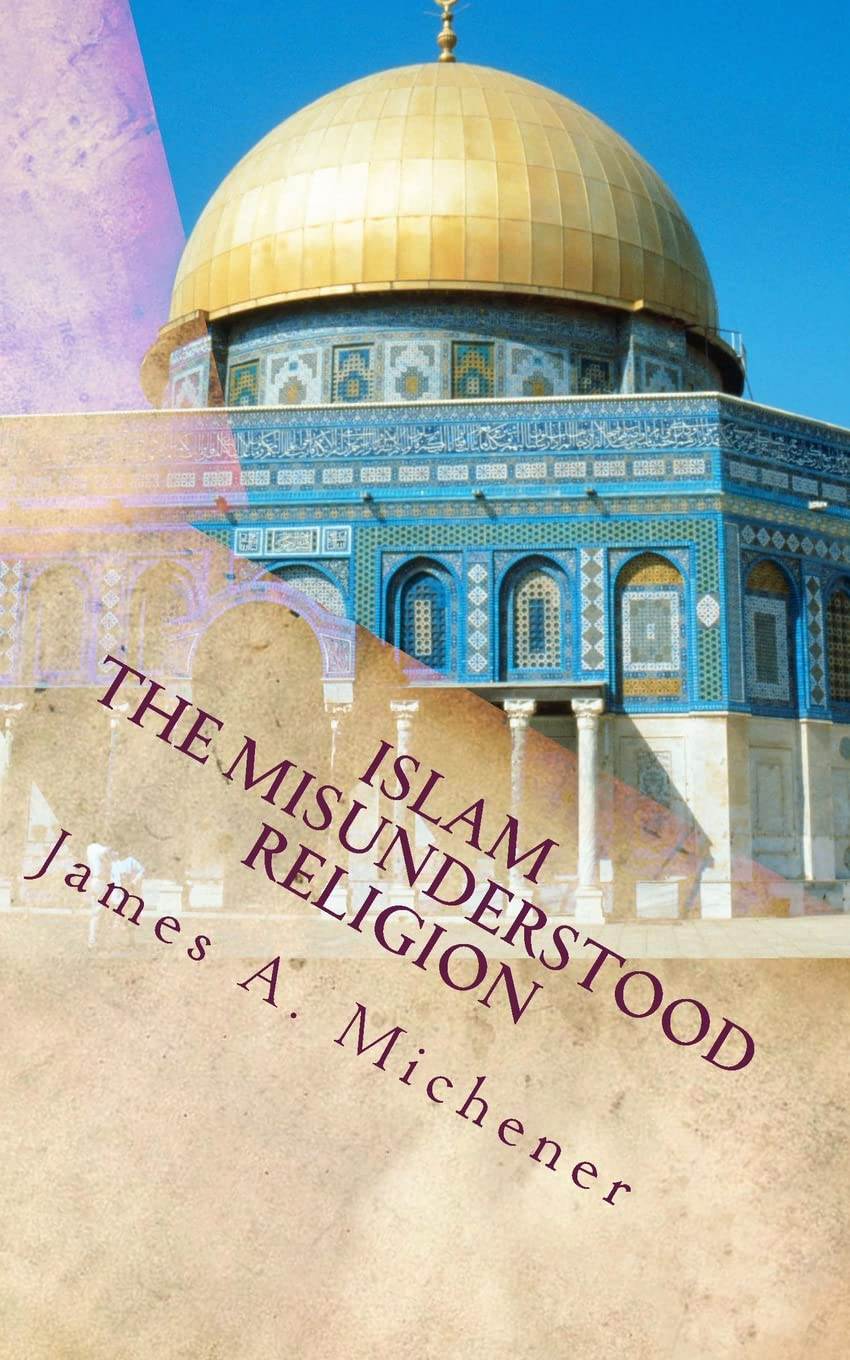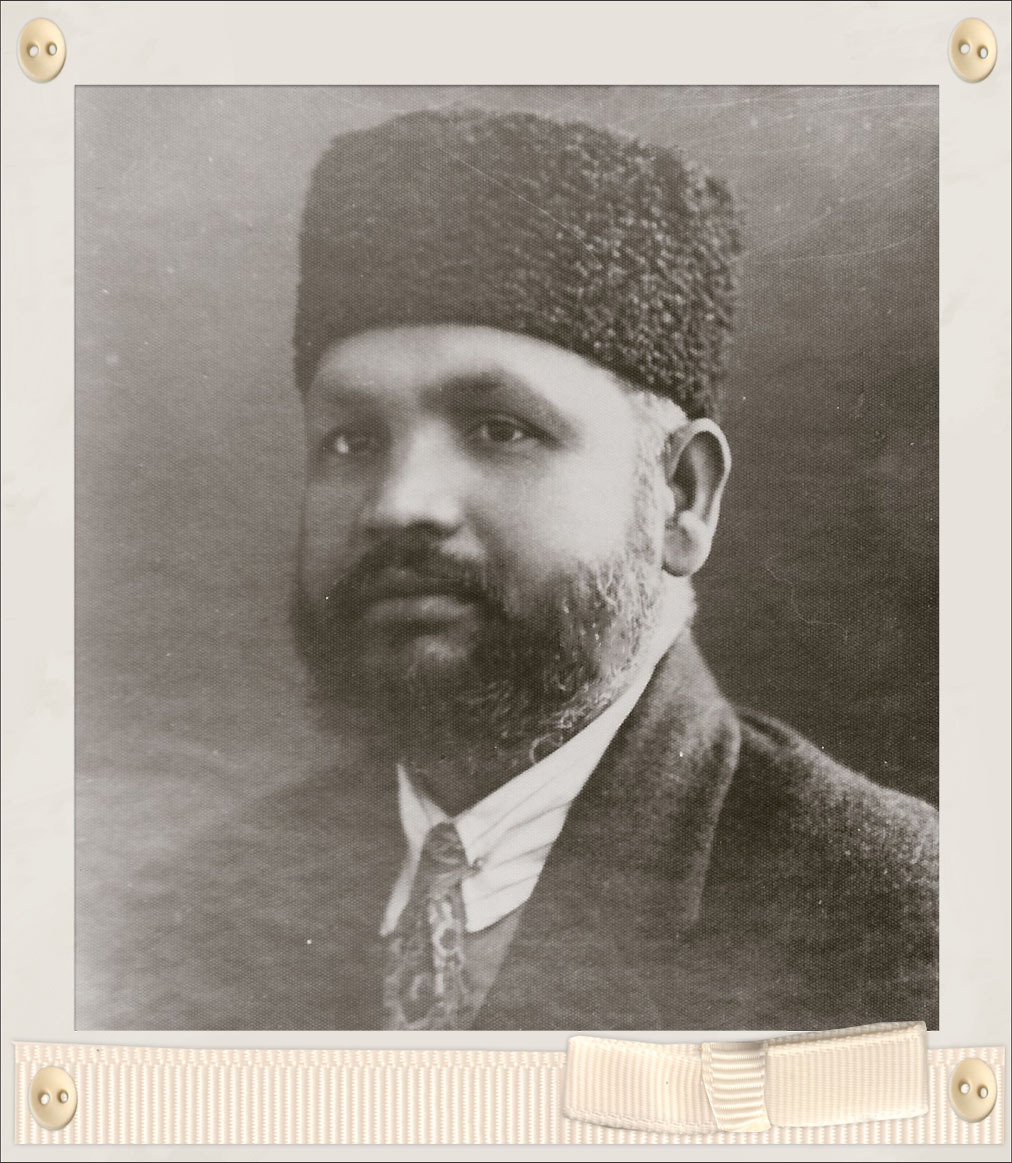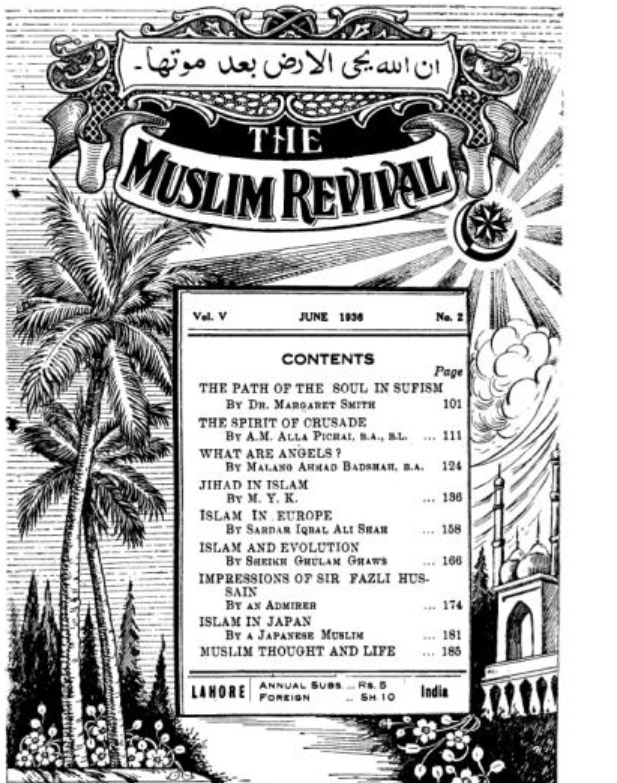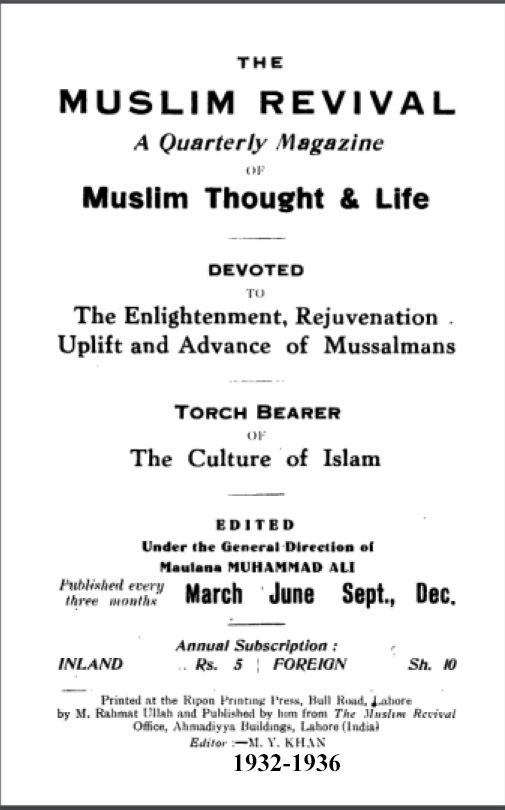ISLAM: The Misunderstood Religion
”One of the strangest facts in today’s world is that Islam, a religion in many ways identical with Christianity and Judaism, should be so poorly understood in Europe and America.”
“I have been studying Islam for many years, and I cannot see any valid reason why this religion and others cannot cooperate.”
BY JAMES A. MICHENER
AUTHOR OF The Bridges at Toko-ri, Tales of the South Pacific, Sayonara, Hawaii, etc.
Note. —The above article was published in the Reader’s Digest. Mr. Michener is a Christian American writer of great repute and has many admirers all over the world. I am one of them as the reproduction of this article proves. I have requested the Editor of The Light to publish this article in whole in one issue of this paper, so that it will serve as a stimulant and eye-opener to some of our Muslim friends, especially from Dacca side, who tend to offer apologies for the great, true and universal religion of Islam. The Addisonian dictum does not hold true in the case of a missionary religion like Islam, whose fair name must be kept clear of all blemishes. The article is a link in that chain.
One of the strangest facts in today’s world is that Islam, a religion which in many ways is almost identical with Christianity and Judaism, should be so poorly understood in Europe and America. Since there are 350 million Moslems in the world, and since they control many strategic areas of the earth, it is essential that we understand them better.
But look what happened recently to a distinguished Moslem who visited the United States. Count the insults that were unconsciously heaped upon him: He was shown a Mosaic in a New York Church and told, “See! We appreciate your Prophet, too.” But, in the Mosaic, Jesus, Moses and Buddha were shown seeking men’s souls with reason and light. Mohammed was shown with a sword, offering conversion or death. Later he saw a film in which brave and holy crusaders were shown fighting craven Moslems for possession of the Christian city of Jerusalem. The crusaders appeared as educated, sensitive men, the Moslems as illiterate brutes.
A newspaper carried an account of Mohammad’s lead coffin, which, according to legend, hovers mysteriously somewhere between heaven and earth. The news story naturally cast ridicule on such a belief.
In several discussions, the visitor heard his religion characterized as “sumptuous”, “voluptuous”, “sybaritic” and “pleasure-loving”. At a public meeting, a speaker said as a joke, “Well, if the mountain does not come to Mohammed, Mohammed will have to go to the mountain. That happens to many would-be prophets”. The audience chuckled. Worst of all, wherever he went, this man was called a “Mohammedan”, and his religion was referred to as “Mohammadanism”. These are two of the most unfortunate words one can use to describe this powerful religion.
(Some years ago, when Sir Mohammad Zafarullah Khan was representing Pakistan in the United Nations some U.N.O. official uttered the same joke in public and was ticked off by Sir Zafarullah, who made him apologise for uttering such a false and nonsensical story about the holy Prophet) – M. A. Faruqui
Let us see why these experiences would be so offensive to a believer in Islam.
The Founder
Mohammed, the inspired man who founded Islam, was born about A. D. 570 at Mecca. Orphaned at birth, he was always particularly solicitous of the poor and the needy, the widow and the orphan, the slave and the downtrodden. At 20, he was already a successful businessman and soon became director of camel caravans for a wealthy widow. When he reached 25, his employer recognized his merit and proposed marriage. Even though she was 15 years his senior, he married her, and as long as she lived, he remained a devoted husband.
By 40 this man of the desert had secured for himself a most satisfying life: a loving wife, five children and wealth. Then, Moslems believe, in a series of dramatic and terrifying events he began to receive through the Archangel Gabreil a revelation of God’s word.
Like almost every major prophet before him, Muhammad fought shy of serving as the transmitter of God’s word, sensing his own inadequacy. But the angel commanded, “Read”! So far as we know, Muhammad was hardly able to read or write, but he began to dictate those inspired words which would soon revolutionize a large part of the earth; “There is but one God.”
Muhammad’s message infuriated those rich Arabs whose faith required many idols, and he and his few followers were driven from Mecca, his home. Forced now to fight in defence of the freedom of conscience which he preached, he became an accomplished military leader, although he repeatedly went into battle outmanned and out speared as much as five to one, he won some spectacular victories.
Later he became head of the state, and the testimony even of his enemies is that he administered wisely. The wisdom he displayed in judging intricate cases became the basis for the religious law that governs Islam today. In his final years he was invited to become a dictator or a saint, but be rejected both temptations, insisting that he was an average man to whom God had sent another of His periodic messages to the world.
By the force of his extraordinary personality, Mohammed revolutionized life in Arabia and throughout the Middle East. He preached a religion dedicated to one God. He lifted women from the bondage in which desert custom held them and preached general social justice.
Moslems think it particularly ironic when Muhammad is charged by Western writers with having established a voluptuous religion. Among drunkards, he abolished alcohol so that even today, all good Muslims are teetotallers. Among the lazy, he ordained individual ritual prayers five times each day. In a nation that revelled in feasting, he instituted a most rigorous daytime fast that lasted a full month each year.
Western critics have based their charges of voluptuousness mainly on the question of women. Before Muhammad, however, men were encouraged to take innumerable wives; he limited them to four only, and the Koran is explicit that husbands who are unable to maintain strict equality between two or more wives must confine themselves to one.
A widespread misunderstanding arises from Mohammed’s promise of paradise. In a land of blistering drought and sandstorms, he predicted that evil men would suffer the tormenting fires of hell, whereas good men would be transported to a perpetual paradise of cool breezes, comforting streams and beautiful Houries.
Western imagination, unfamiliar with this last word, defined it by analogy with one of the ugliest words in English and jumped to the conclusion that Muhammad’s paradise was to be a sexual debauch. They were wrong. An Hourie is a fair-skinned, black-eyed woman created from musk and spices, incredibly beautiful and perpetually virgin.
Last summer I stood at the edge of an Asian desert with one of Islam’s greatest philosophers, and he said, “Today much effort is being spent to prove that Mohammed’s paradise was only symbolic. Wise men explain away everything. But let me tell you this. I have lived my whole life of faithfulness to God in this baking desert. I’ve avoided one earthly temptation after another in an effort to gain paradise. If I get there and find no cool rivers, no date trees and no beautiful chaste girls made of musk and spice to keep me company, I shall feel badly defrauded”.
In all things Mohammed was profoundly practical. When his beloved son Ibrahim died, an eclipse occurred, and rumours of God’s personal condolence quickly arose. Whereupon Mohammed is said to have announced, “An eclipse is a phenomenon of nature. It is foolish to attribute such things to the birth or death of a human being.”
At Mohammed’s own death, an attempt was made to deify him, but the man who was to become his administrative successor killed the hysteria with one of the noblest speeches in religious history:
“If there are any among you who worshipped Mohammed, he is dead. But if it was God you worshipped, He lives for ever.”
Mohammed, the man, was buried in an ordinary tomb whose location has always been known. The story of the floating lead coffin arose in Europe in later centuries. These things explain why people who follow the religion of Mohammed do not like to be called “Mohammedens”. Said the desert philosopher last summer, “A Christian is a man who believes that Christ was a part of God, and the central fact of his religion. A `Mohammeden’, by analogy would have to be a man who believed that Mohammed was likewise a part of God, and the central fact of his religion. But Mohammed was a man. He married, had children, earned a living, died and was buried in a grave like the rest of us. No learned man would worship Mohammed. It is God we worship. Therefore, call us Moslems – those who submit to the will of God.”
The Book
The Koran is probably the most often read book in the world, surely the most often memorized, and possibly the most influential in the daily life of the people who believe in it. Not quite so long as the New Testament, written in an exalted style, it is neither poetry nor ordinary prose, yet it possesses the ability to arouse its hearers to ecstasies of faith. Its rhythms have been compared to the beat of drums, to the echoes of nature and to the chants which are common in all early societies.
It is written in Arabic, and devout Moslems have often insisted that it must not be translated into any other language. One might expect that such a wish would have limited the spread of Islam. On the contrary, all over the world men have laboured to learn Arabic, not an easy language, just to be able to read their holy book and pray in the original.
(This orthodox viewpoint is now changing. The Holy Quran has now been translated into several languages; for Islam being the universal religion, must be understood by all nations of the world. The Arabic text of the Holy Quran, being the word of god, must remain and be recited as such, whenever the occasion demands – M.A.Faruqui)
The Koran was revealed to Mohammed between the years 610 and 632 in the cities of Mecca and Medina. Devoted scribes wrote it down on “scraps of paper, bark and the white shoulder blade of animals.” The early revelations were dazzling assurances that there was only one God, Merciful and Compassionate: “He is Allah, the Creator, the Maker, the Fashioner. Whatever is in the heavens and the earth declares His glory; and He is the Mighty, the Wise.”
It was this message that inspired them to revolutionize their lives and their nations. In later years, when Islam began to penetrate large areas of Arabia and had acquired much power, the revelations dealt with the organization of society, its laws, procedures and problems.
The Christian or Jew who read the Koran finds himself on familiar ground a good deal of the time. If the following random verses, chosen from hundreds like them, were suddenly read in a church or synagogue, the congregation might have trouble guessing where they came from.
“Cried one of the brothers, ‘Say not Joseph, but if ye must do something, throw him down to the bottom of the well; he will be picked up by a caravan of travellers.”
“So also, was Jonah among those sent by Us. When he ran away to the ship fully laden, he agreed to cast lots and was condemned. Then the big Fish did swallow him.”
“Mary asked: ’How shall I have a son, seeing that no man has touched me, and I am not unchaste.’ The Angel replied: ’So it will be. Thy Lord
saith this is easy for Me,’ So she conceived him, and retired with him she to a remote place.”
Islam is partly founded on the words of four prophets who lived before Mohammad – Jesus, Noah, Abraham, Moses. The Koran does not acknowledge that Jesus was the Son of God and that he suffered death upon the Cross; if Jesus was acknowledged the child of God, Moslems believe it will compromise God’s oneness, which is the cornerstone of Islam. It would, moreover, be difficult thereafter to contend that Mohammad was the bearer of the final perfect revelation, as Muslims do.
The Koran is remarkably down-to-earth in its discussion of the good life. In one memorable passage it directs:
“When ye deal with each other in transactions involving future obligations, reduce them to writing… and get two witnesses, so that if one of them errs the other can remind him. This is juster in the sight of God, more suitable as evidence, and more convenient to prevent doubts among yourselves.”
It is this dedication to one God plus practical instruction that makes the Koran unique. Each Islamic nation contains many citizens who are convinced that their land will be governed well only if its laws conform to the Koran.
The Traditions
In addition to the Koran, Islam relies upon “Traditions” – what Mohammed said and did. These are largely affectionate campfire gossip, the odds and ends that would be remembered after a great man had died.
About 200 years after Mohammed’s death, more than 600,000 separate anecdotes about him were current, and several great scholars undertook the job of checking them for historical validity. More than 597,000 were rejected. The remainder, called the Hadith, are accepted by all good Moslems.
Much of Islam’s common sense comes from them. For example:
“One dark night Mohammed had to escort his wife home from the mosque. On the way he saw two men giggling in the shadows, so he called them to him, lifted his wife’s veil and said, ‘See, it is my wife with whom I walk.’ When the strangers protested that they trusted him, he said, ’I was not worried about your trust of me. I did not want your faith to be affected by your suspicion’.”
Once a Jew came to the prophet and protested that Mohammed’s Chief Assistant had outraged Jews by claiming that Mohammed was more exalted than Moses. The Prophet said to his Assistant: “You should not have said this. The feelings of other people must be respected.”
Also, some of the profoundest elements of Moslem faith and culture derive from these traditions. Every Moslem, in beginning a meal or entering upon any other task, repeats “In the name of God, Most Beneficent, Most Merciful.” This is the opening verse of the Koran. Moslems greet each other with the traditional, salutation, “Peace be on you.” The whole ritual of congregational prayer is taken from the traditions, including the well-known call to worship.
Some traditions influenced Western behaviour:
“On one occasion Mohammed saw a donkey being branded on the face. When asked why this was being done, the herdsmen said, ‘The Romans taught us this to prevent theft.’ Mohammed reflected a moment and said, ‘An animal’s face is the most sensitive part of its body. If you must brand them, do it on the flanks, where the flesh is thicker.’ And the custom spread.”
As a successful general, Mohammed left many traditions regarding decent conduct in war:
“Faithfully carry out all covenants and agreements. Avoid treachery and do not disfigure the enemy dead. Do not slay children, women, old men or persons dedicated to the service of religion. Do not destroy sacred objects, orchards or crops.”
Mohammed was sceptical about miracles, and rebuked those who sought them. Nevertheless, several have been ascribed to him. The famous story of Mohammed and the Mountain, however, relates to a clownish fakir of that name who lived in Turkey centuries after the Prophet. In a bit of horseplay, he announced that, on the morrow, he would make the nearby mountain come to him. When the mountain declined, he shrugged his shoulders and said, “Well, I’ll go to the mountain.”
Throughout the traditions, Mohammed appears as a saintly man, one whom devout people of all religions would have recognized immediately as deeply concerned about the nature of God. He preached that slaves should be set free, that fathers should not kill unwanted baby girls, that those oppressed by society inherit the earth, that peace is better than war; that justice prevails. There is much proof that Mohammed hoped for the day when all who shared a common belief in God would exist together in peace. It is well documented that, on one occasion, when a deputation of Christians visited him, he said, when time for prayers arrived, “Conduct your service here in the Mosque. It is a place consecrated to God.”
The Religion
To be a Moslem, one must submit to five disciplines:
1.The Moslem must confess that “there is no god but God, and Mohammed is His prophet.” This confession does not mean that Mohammed was God’s only prophet. The Jewish prophets are included and the Christian prophet, Jesus, is given special reverence. What Moslems do contend is that Mohammed was ‘the seal of the prophets’, who brought God’s final message. His dispensation sums up and supersedes all others.
2. The Moslems must observe ritual prayers five times daily – at dawn, at noon, in the afternoon, after sunset and at night, preferably in congregation. All visitors to Islam testify that one of the most extraordinary sights in world religions occurs when, in a dimly lit mosque, hundreds of men stand shoulder to shoulder, then bow and
prostrate themselves as they face Mecca. It is in such prayer that the brotherhood of Islam is born.
3. The Muslims must contribute two and a half per cent of his gross wealth (not income) to charity every year. Like the Christian tithe, this has become a matter of individual conscience. The principle, however, is of great importance to Moslem nations, for it justifies modern taxes for social welfare,
(There is a Nisab fixed so the wealth saved over the year must amount to a certain value or figure before Zakat is levied).
(The Light – Augest1, 1965)




